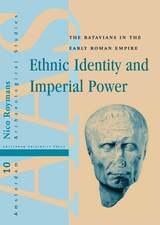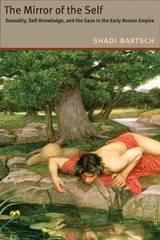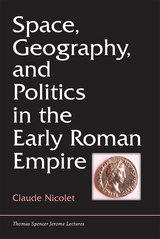3 books about Early Roman Empire

Ethnic Identity and Imperial Power
The Batavians in the Early Roman Empire
Nico Roymans
Amsterdam University Press, 2005
This probing case study examines the evolution of the ethnic identity of the Batavians, a lower Rhineland tribe in the western marches of the Roman Empire. Drawing on extensive historical and archaeological data, Nico Roymans examines how between 50 BCE and 70 CE, the Romans cultivated the Batavians as an ethnic "other" by intensively recruiting them to the Roman army while simultaneously carrying out extermination campaigns against other tribes in the region. Roymans also considers how the status of the Batavian settlement reveals intriguing insights into Roman definitions of "civilization" and "barbarism." Ethnic Identity and Imperial Power is a fascinating anthropological study on how ancient frontier peoples negotiated their self-image.
[more]

The Mirror of the Self
Sexuality, Self-Knowledge, and the Gaze in the Early Roman Empire
Shadi Bartsch
University of Chicago Press, 2006
People in the ancient world thought of vision as both an ethical tool and a tactile sense, akin to touch. Gazing upon someone—or oneself—was treated as a path to philosophical self-knowledge, but the question of tactility introduced an erotic element as well. In The Mirror of the Self, Shadi Bartsch asserts that these links among vision, sexuality, and self-knowledge are key to the classical understanding of the self.
Weaving together literary theory, philosophy, and social history, Bartsch traces this complex notion of self from Plato’s Greece to Seneca’s Rome. She starts by showing how ancient authors envisioned the mirror as both a tool for ethical self-improvement and, paradoxically, a sign of erotic self-indulgence. Her reading of the Phaedrus, for example, demonstrates that the mirroring gaze in Plato, because of its sexual possibilities, could not be adopted by Roman philosophers and their students. Bartsch goes on to examine the Roman treatment of the ethical and sexual gaze, and she traces how self-knowledge, the philosopher’s body, and the performance of virtue all played a role in shaping the Roman understanding of the nature of selfhood. Culminating in a profoundly original reading of Medea, The Mirror of the Self illustrates how Seneca, in his Stoic quest for self-knowledge, embodies the Roman view, marking a new point in human thought about self-perception.
Bartsch leads readers on a journey that unveils divided selves, moral hypocrisy, and lustful Stoics—and offers fresh insights about seminal works. At once sexy and philosophical, The Mirror of the Self will be required reading for classicists, philosophers, and anthropologists alike.
Weaving together literary theory, philosophy, and social history, Bartsch traces this complex notion of self from Plato’s Greece to Seneca’s Rome. She starts by showing how ancient authors envisioned the mirror as both a tool for ethical self-improvement and, paradoxically, a sign of erotic self-indulgence. Her reading of the Phaedrus, for example, demonstrates that the mirroring gaze in Plato, because of its sexual possibilities, could not be adopted by Roman philosophers and their students. Bartsch goes on to examine the Roman treatment of the ethical and sexual gaze, and she traces how self-knowledge, the philosopher’s body, and the performance of virtue all played a role in shaping the Roman understanding of the nature of selfhood. Culminating in a profoundly original reading of Medea, The Mirror of the Self illustrates how Seneca, in his Stoic quest for self-knowledge, embodies the Roman view, marking a new point in human thought about self-perception.
Bartsch leads readers on a journey that unveils divided selves, moral hypocrisy, and lustful Stoics—and offers fresh insights about seminal works. At once sexy and philosophical, The Mirror of the Self will be required reading for classicists, philosophers, and anthropologists alike.
[more]

Space, Geography, and Politics in the Early Roman Empire
Claude Nicolet
University of Michigan Press, 2015
Drawing on unexpected texts both ancient and modern, Space, Geography, and Politics in the Early Roman Empire offers startling insights into the character of Rome and its princeps-turned-emperor, Augustus. Claude Nicolet documents Roman expansion at the start of the early imperial period and explores how Romans came to map the world they knew and conquered. The roles of both the agrimensores, who worked in the state’s interest observing and recording new territories, and M. Vipsanius Agrippa, the sometime son-in-law of Emperor Augustus, are considered. Nicolet also presents the integral relations between territorial expansion and political expansion, as well as between propaganda cultivated in the national interest and propaganda designed to secure the status of the princeps as primus inter pares, first among equals.
[more]
READERS
Browse our collection.
PUBLISHERS
See BiblioVault's publisher services.
STUDENT SERVICES
Files for college accessibility offices.
UChicago Accessibility Resources
home | accessibility | search | about | contact us
BiblioVault ® 2001 - 2024
The University of Chicago Press









